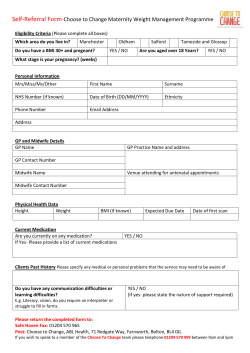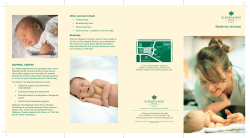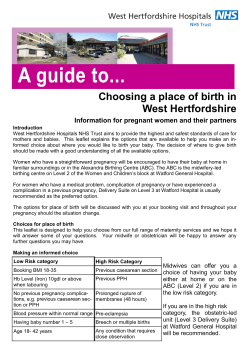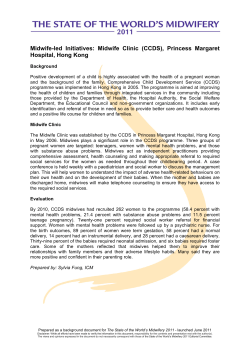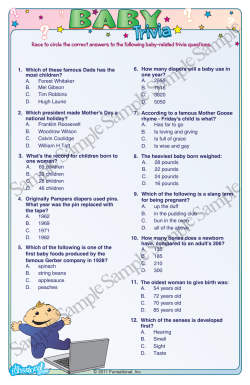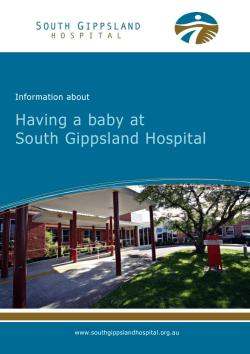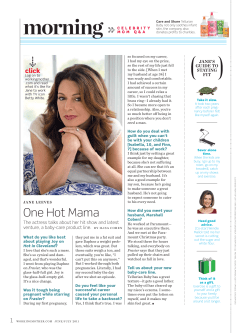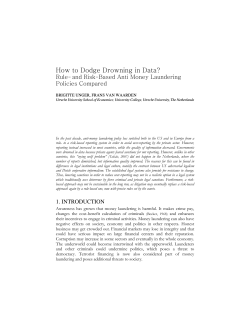
Having a Baby in the Netherlands Guide
SERVING THE NEEDS OF THE INTERNATIONAL COMMUNITY Guide BASED ON FREQUENTLY ASKED QUESTIONS Having a Baby in the Netherlands Zeestraat 100 – 2nd Floor 2518 AD The Hague Tel: 0900 2 ACCESS (0900 2 222377) 10:00–16:00, Monday–Friday helpdesk@access-nl.org www.access-nl.org Having a Baby in the Netherlands Contents Introduction .............................................................................................. 3 Frequently asked questions ................................................................ 3 Prenatal Care ......................................................................................................... 3 Giving Birth ............................................................................................................ 6 Kraamzorg (post natal maternity care) ....................................................... 7 Birth Registration ................................................................................................ 9 Baby health .......................................................................................................... 10 Legal and financial matters ........................................................................... 11 Author : Sabine Walsh Last update by : Sabine Walsh, Jessie Blijden (June 2012) This ACCESS Guide has been compiled with the generous assistance of Bureau Kraamzorg Extra Rijswijk 2 | ACCESS Having a Baby in the Netherlands Introduction When you are an expat living away from home, having a baby can be an overwhelming experience, but it need not be a stressful one. It is important you carefully research all your options. You will need to make good decisions ahead of time to insure that you get the kind of birth that you will be comfortable with. You will find that the health care system in the Netherlands provides well-organized care. However, many practices here may differ from what is usually done in your home country. For instance, more than 60% of Dutch women get pregnant, have a baby and go home without seeing a gynaecologist once. Home births and using only a midwife to assist are also fairly common practices here - although the numbers are declining. In general, there is a natural, non-interventionist approach to medical and maternity care in the Netherlands. It is also known that doctors tend to provide less information to their patients about their conditions, and there is far less preventative screening than in many other western countries. ACCESS is proudly supported by several healthcare providers and trainers. Please refer to our website for the most current list outlining who they are and what they offer. Frequently asked questions ACCESS has many years of experience serving members of the international community. The questions outlined below are a collection of frequently asked questions ACCESS has received in the past years. Please note that some of the websites mentioned in the answers are in Dutch only, but you can read them in English by using Google Translate (www.google.com/translate). It will not always give a perfect translation, but it will give you an idea what the text is about. Prenatal Care Q. I am pregnant and will be giving birth in the Netherlands. What practical preparations do I need to take? The Dutch philosophy is that childbirth is a natural, physical process, not a medical condition. Prenatal care is usually provided by midwives. The role of the doctor or gynaecologist in a normal pregnancy in the Netherlands is minor and in most cases they do not get involved at all, unless there are complications. Therefore, the first priority is to find a midwife. It is best to register with your midwife by week 8-10 or as soon as you arrive in the Netherlands You can look in ‘The Yellow Pages under “verloskundigepraktijk” or talk to your family doctor (GP) - he will be able to point you in the right direction! A few other things that you can do are as follows: 3 | ACCESS Having a Baby in the Netherlands Make sure you know what your medical insurance covers for you; Register yourself with a ‘kraamzorg’ agency (postnatal care), preferably before the 12th week of pregnancy. Your midwife can direct you to organisations they partner with and your health insurance provider must be contacted to ensure your chosen kraamzorg is approved by them; Decide where you want your baby delivered – the Dutch are big believers in home births so make it clear if you want a hospital birth if that is what you prefer. The rate of epidural use in the Netherlands is low and there is sometimes an absence of anaesthetists available during “out of normal hours” so find out which hospitals can honour your request for pain relief. In addition to midwife visits, you can also attend a childbirth preparation class. Q. Can you please tell me what services I can expect from a midwife? Midwives in the Netherlands are the lead professionals providing care to women with 'normal' or uncomplicated pregnancies. They are independent practitioners, like GP’s and work in single-handed, duo-, or group practices. In case of complications or an increased risk of complications during pregnancy, during labour or in the postpartum period, the midwife will refer her client to a gynaecologist who will take over responsibility. As an independent practitioner, a midwife can legally practice obstetrics without supervision of a medical doctor. She is the sole health care provider during pregnancy, labour, delivery and the initial postpartum period. In short, she will help you make sure that you and your baby are safe from pregnancy to delivery. Among other things, she will take you and your partner’s medical history, as well as that of your family; monitor your weight and blood pressure, the foetal growth, position and heart beat; check your blood iron levels; discuss with you plans about delivery, whether home birth or in a hospital; supervise you during labour, delivery and the initial postpartum period. You can phone the midwife yourself to make the appointment. You will find midwives listed in the yellow pages under verloskundigenpraktijk. Q. How can I find a native English speaking midwife? Most midwives in the Netherlands have good command of the English language. Your GP can most likely refer you to an English speaking midwife, so please don’t hesitate to ask him for a referral or recommendation. You may also find midwives (Dutch and English speaking) listed in the yellow pages under “verloskundingepraktijk”. We also suggest that you visit the website of the Royal Netherlands Organisation of Midwives (http://www.knov.nl/). This is the only midwifery organisation in the Netherlands. Its membership is comprised of independent midwives (around 1200), locums (300), secondary care working midwives (350), student midwives and others. The website is in Dutch but you may use Google Translate. It doesn’t always give a 4 | ACCESS Having a Baby in the Netherlands perfect translation but it gives you an idea of what the original text is about. English should not be a problem if you contact them by phone (Tel: +31 (0)30 282 31 00) or email (info@knov.nl) and they can refer you to one of their members who speaks English and has experience assisting a member of the international community like you. Q. Which prenatal tests are usually carried out in the Netherlands? Prenatal tests are generally only carried out when you have a medical history indicating the need for this, or when you are over 35 years of age. Some screenings such as blood tests and ultrasounds are done in specialist centres. If you want, you can have an ultrasound made by a specialist, around week 20 of the pregnancy. An ultrasound may only be covered by your insurance when it is medically required. Q. Should I follow a prenatal course? Courses are organised to educate women for labour offering you tools to manage your labour pain such as breathing techniques, massage, optimal positions for birth and tips for recovery after birth. Of course any prenatal course you attend provides an opportunity to meet other expectant mothers or couples, but the class you choose, and how helpful it turns out to be once labour starts, may depend on your knowledge of the Dutch language. Choose a prenatal group carefully. Courses last between 4 to 8 weeks and are often followed by a postnatal reunion. It is recommend to register by week 16 as the classes often fill very quickly. In larger Dutch cities there are often prenatal courses especially for expats. If you need help to find a local prenatal course, please contact the ACCESS Helpdesk on 0900 2 222377(€0.20/c per min) 10:00–16:00, Monday to Friday, or send us an email at helpdesk@access-nl.org. Q. Where can I learn more about breastfeeding? A good place to start is to contact your kraamzorg agency as many of them have lactation specialists and offer their own breastfeeding sessions for expecting mothers. They will also be there to offer support and advice during the first week of your baby’s life. If you have any question or problem, you can also visit the website of the Samenwerkende Borstvoeding Organisaties (SBA) (Cooperating Breastfeeding Organisations) http://www.borstvoeding.nl. There you can find a link to the main five organisations involved in protecting, promoting and supporting breastfeeding in the Netherlands as well as a tool to locate breastfeeding cafes near you. 5 | ACCESS Having a Baby in the Netherlands Giving Birth Q. Where can I give birth? If you have an uncomplicated pregnancy you can choose to give birth at home with a midwife, or in a hospital - either with a midwife (poliklinische bevalling) or a gynaecologist (ziekenhuisbevalling), based on medical advice. The Dutch are big believers in home births so make it clear if you want a hospital birth or home birth. You always have the option to go to the hospital, but check first what your insurance company covers. Q. What will happen if I choose to give birth at home? Your midwife will attend the labour and delivery. She will also help with preparations to ensure the safety and comfort of you and your child. Home deliveries require metal bed raisers - klossen (or beer-crates), which you will need so that the height of your bed complies with health and safety regulations for the attending maternity professionals. This is also a requirement for the professional maternity nurse (kraamverzorgende) when she comes to your house once your child is born. Should any complications arise, you will be taken to hospital. Q. Can I choose to give birth in a hospital If you opt for a hospital delivery you must register with a hospital within the first few months of your pregnancy. A woman may choose the hospital where she wants to give birth, although most elect to go to their nearest hospital, or one where their chosen midwife or gynaecologist works. The midwife is met at the hospital and if there are no complications an obstetrician will not attend. Most hospitals organise information evenings, including a tour of the maternity unit, which may help you make a decision. Please note that unless a hospital birth is necessary for medical reasons, health insurance policies may not cover the entire bill so check with your insurance provider. Women usually return home within 24 hours of delivery and may be free to leave from as little as four hours after. You will only be discharged once you feel confident and comfortable that you are ready to go home. A stay of less than 24 hours is considered out-patient (poliklinisch). Sometimes giving birth does not go according to plan, e.g. your baby could be overdue and you have to be induced, or you might need a caesarean section. In that case, an obstetrician and a paediatrician will provide assistance. A hospital stay could vary from 24 hours to 10 days, depending on possible interventions during birth and/or necessary post-natal care Q. Will I be able to get pain relief? In the Netherlands, only about 10 % of women in labour are given pain relief; 6 | ACCESS Having a Baby in the Netherlands caesareans are relatively rare and epidural use is low. Normally, pain medication is infrequently offered during birth and you should bring it to your midwife’s attention if it is part of your birth plan. Most Dutch midwives and doctors prefer not to interfere with the natural process of labour and delivery. If you insist on receiving some pain medication, please discuss this with your hospital, as there may be an absence of anaesthetists available during “out of ‘normal’ hours”; so if necessary, do your homework to find out which hospitals can honour your request for pain relief. Pain relief is ruled out at a home birth as midwives are not qualified to administer anaesthetics and restricted to using over-the-counter drugs. Kraamzorg (post natal maternity care) Q. What is Kraamzorg? Every pregnant woman in the Netherlands has the right to kraamzorg (post natal maternity care) but the hours she is entitled to vary depending on her particular circumstances. You have two options for postnatal maternity care which are as follows: a medically trained professional maternity nurse (kraamverzorgende) a non-medically trained doula Q. What is a role of a kraamverzorgende? The kraamverzorgende is a trained medical professional and will provide a range of services that can involve: helping during a home delivery guiding the mother through the feeding, bathing and taking care of their child, physically as well as emotionally, teaching how to recognise baby’s needs and how to attend to them monitoring health of the mother and her newborn, acting as a link between the family and the midwife/family doctor ensuring the house is hygienic by cleaning every day the toilets, the bathroom and the mother and baby rooms aiding with light household maintenance during her stay to ensure the mother gets enough rest. The exact details of what your particular kraamverzorgende will deal with, as well as the frequency and length of her visits, will be determined before birth. This prenatal housecall takes place at around the 7th or 8th month and allows both parties to discuss your needs and expectations. Once the baby is born you can adjust the agreed schedule to more or less involvement should you feel the need to do so after consultation with the agency. Flexibility is the key here. 7 | ACCESS Having a Baby in the Netherlands It is important to note that the kraamverzorgende is trained to guide and assist, not dominate or interfere. You may balk at the idea of someone coming into your home but these are women prepared for cultural differences and a household with its own rules and customs. They adapt to your way of doing things, not the other way around. You don’t want to breastfeed? That's fine. The support is there if you want it. The choice is entirely yours. Q. How can I register with a kraamzorg? You have to register yourself with a “kraamzorg” agency, preferably before the 12th week of pregnancy, to be sure that you don’t miss this unique care! These days, most agencies accept registrations for the service at any point during the pregnancy, although those looking to make use of it are strongly advised to register as early on as possible. The sooner contact has been made, the more time both parties have to make arrangements and communicate their needs and expectations. An excellent source of information and websites is: www.kraamzorg.nl. Click on “Kraamcentrum” and scroll down to the town of your residence. Also, your midwife can direct you to organisations they partner with. Your health insurance provider must be contacted to ensure your chosen kraamzorg is approved by them. Q. How much will the kraamzorg cost me? Every pregnant woman in the Netherlands has the right to kraamzorg (post natal maternity care) but the hours she is entitled to vary depending on her particular circumstances. Families generally receive an average of 49 hours of care, at a rate of €4 of eigen bijdrage (own contribution) per hour. Depending on your health insurance coverage, this contribution can be partially or even wholly refunded when the service comes to a close. Please check with your health insurance provider for further details regarding costs. If you have a non-Dutch healthcare provider, you should get in touch with the kraamzorg agency as they will be able to tell you more about your situation or contact your insurer themselves. Q. What is a doula and what can she help me with? Doulas support women and their families during pregnancy, childbirth and early parenthood. This support is practical and emotional but non-medical in nature as doulas are not medically trained. Engaging a doula is a relatively new phenomenon in the Netherlands. Post-natal doulas assist new mothers once at home with emotional support as well as physical assistance around the home. After the birth, the doula will visit the couple once or twice to debrief the birth. Some doulas provide birth hypnosis and other support strategies. All doulas are on call 24 hours a day for their clients and many provide an on8 | ACCESS Having a Baby in the Netherlands going postnatal support service. The national website for doulas (http://www.doula.nl/english.htm) has a directory as well as an overview in English. Please note that the cost of a doula is not covered by insurance companies. Birth Registration Q. I am going to have a child. What should I do to register her/his birth? Every child born in the Netherlands must be registered at the municipal population affairs office of the town where the baby was born, within three days of its birth. If you are unable to do so because of a weekend or public holiday, you must register the birth on the first available working day. This service is provided free of charge The Registrar of Births, Deaths, Marriages and Registered Partnerships will draw up a birth certificate. This is the legal proof of the child's birth. The father should do the registration. If he is not able to register his child or if the father is not known, somebody else who was present at the birth is allowed to do it (e.g. family member, doctor, midwife etc.). If none of these authorised persons are able or authorised to register the birth, the birth will be registered by a civil servant. The mayor appoints the civil servant to do this task. You will also need to bring the following: A valid identity document for the person registering the birth A valid identity document for the mother A statement by the doctor or midwife. This is to confirm the identity of the mother A marriage certificate of the mother (if relevant). Your child will be on this (not compulsory) A copy of the deed of acknowledgment is required, if the child has already been acknowledged before birth. In this case, a certificate about the choice of the last name may be needed also if the decision about the last name has been made. Q. My partner and I are living together but we are not married and I am going to have a baby. Will my partner be officially recognised as the father? If you and your partner are not married and the father wants to be regarded as the child's lawful father, he must acknowledge the child. This also applies if you have a registered partnership or a cohabitation agreement. Acknowledging the child may be important for the right of inheritance, nationality, determining parental access and/or parental guidance. Your partner may acknowledge the child before the child is born by having a deed of 9 | ACCESS Having a Baby in the Netherlands acknowledgement drawn up by the registrar of births, deaths and marriages or a notary. Alternatively, he can acknowledge the child when registering the birth or at any time afterwards and he needs the mother written consent in advance. Only if you have a registered partnership the father is obliged to provide for his child even if he does not acknowledge him/her. The child also acquires the right to inherit from its father. Q. I am going to have a baby in The Netherlands. Will my child have a Dutch nationality? Children born in the Netherlands to two foreign parents do not acquire Dutch citizenship at birth. If you are Dutch or married with a Dutch citizen, your child automatically acquires Dutch nationality at birth. If you are not Dutch and unmarried but the father is Dutch, the father must acknowledge the child before birth or before it reaches seven years of age. After the child seventh birthday different procedures are needed. Once the child has been acknowledged, it acquires Dutch nationality. Q. I want to travel with my baby. Does he need a passport? All babies and minors need their own passport to travel. If only one parent is Dutch the child can claim the nationality of both parents. You’ll have to arrange this through the relevant embassies. If neither of you are Dutch, then your child isn’t either. Should you want to travel, you will have to apply for a passport for the child from your embassy. Baby health Q. What check-ups will be done afterwards? Your midwife will visit you at home in the first week after the baby is born. If you have seen a gynaecologist instead of a midwife, you must go to their clinic for appointments, or arrange for your doctor or midwife to visit you at home. You will have a final post-natal check up six weeks after the baby is born Q. What does a Child health clinic (consultatiebureau) do? Preventative care is the consultatiebureau’s (Child Health Clinic) main goal. It provides free-of-charge vaccinations and checks the growth and development of babies and toddlers up to four years of age under the guidance of resident nurses and doctors. Within two weeks of your child's registration with the municipality (regardless of where your child is born) a consultatiebureau nurse will pay an initial visit with you in your 10 | ACCESS Having a Baby in the Netherlands home. During this visit, the nurse will gather your child's medical history, introduce you to the consultatiebureau system and provide you with a copy of the "Groei Op" (Grow Up) book and the name and location of your nearest consultatiebureau. Contact details of your local consultatiebureau will also be indicated in the “Groei Op” book. If you do not have this book, your family doctor or midwife can direct you to your nearest consultatiebureau. Q. Which vaccinations are common in the Netherlands and how can I arrange them for my children? All vaccinations are given at the Consultation Bureau (Consultatiebureau). The Dutch national immunisation programme includes vaccinations for the following diseases: DKTP: D = Diphteria, K = Whooping Cough, T = Tetanus, P = Polio-myelitis HIB = Haemophilus influenzae type B BMR = Mumps, Measles, Rubella (German Measles) Men C = Meningitis C Pneu = Pneumococcal vaccination Hep B = Hepatitis B vaccination HPV = Human Papilloma Virus – only for girls Q. I would like my child to have additional shots that are not standard in the Netherlands. How can I arrange this? You will have to contact your GP (Huisarts) or visit a specialised vaccination centre. Please bear in mind that you will probably have to pay for additional shots yourself. Legal and financial matters Q. What maternity leave am I entitled to? Maternity leave is regulated in the Netherlands. You are entitled to 16 weeks paid maternity leave starting four to six weeks before your due date (it is a government requirement that you must stop working 4 weeks before the due date). After the birth, you are always entitled to 10 weeks of paid maternity leave - even if the baby is born later than it was due. During maternity leave, the new mother receives an allowance which matches her salary, but there is a maximum amount. This maximum amount is based on the daily wage, which is €174,64 per day. If she earns more than this, then her income may drop during the period of leave. If the mother is sick after the maternity leave she is entitled to 100% of daily pay. Fathers are entitled to two days of paternity leave - paid in full by the employer, when their partner has just given birth to a child. These entitlements also apply to people adopting a child and to families with more than one child. Both you and your partner 11 | ACCESS Having a Baby in the Netherlands may take unpaid parental leave. This is leave you can take to care for a child who is less than eight years old. You are entitled to parental leave when you have been working for the same employer for at least one year and are caring for a child who is younger than eight years of age. Both parents are entitled to parental leave. If you have more children, you can take parental leave for each child separately. According to the Wet Aanpassing Werktijden (WAA) (Adjustment of Hours Law), people in the Netherlands are entitled to work full-time or part-time according to their needs. Mothers who wish to spend time with their babies and children are allowed to work part-time (four hours per day) returning to full-time employment at later date. Q. How can I get Child benefit and how does it work? If you are living in the Netherlands and/or are employed and pay Dutch income taxes, then you are entitled to kinderbijslag (child benefit). Following registration of your child’s birth, the municipality (Gemeentehuis) forwards your data to the Social Insurance Bank (Sociale Verzekeringsbank - SVB) and within a few days you will receive a registration form. If you arrive with children born outside the Netherlands, you will have to ask the Sociale Verzekeringsbank (SVB) to send you a claim form: http://www.svb.nl/int/en/kinderbijslag/index.jsp When you have claimed child benefit, the SVB will send you a decision, stating the amount you will receive per child and the commencement date of your child benefit, which is a contribution to the cost of raising children. Payment is made on a quarterly basis directly into your bank account up until your child is 18 years of age. The amount paid is based on the age of your child, number of children, special needs, etc. but not on your income. Q. Do I need to change my will with the birth of my child? Foreign wills are not recognised in the Netherlands. If something happens to both of you, then it is not automatic that your child will be cared for by family or friends. In fact, if a will is not made with a particular person mentioned to care for your baby/child, then they will be cared for by the state. You need to make an appointment with a Dutch Solicitor (Notaris) for this. It may be possible to get an international will notarised in some instances. 12 | ACCESS Having a Baby in the Netherlands This ACCESS guide is intended to provide general information. If you need more specific information about this subject please contact the ACCESS Helpdesk on 0900 2 222377(€0.20/c per min) 10:00–16:00, Monday to Friday, or send us an email at helpdesk@access-nl.org. We also work closely with our network of partners, associates and trainers. You can find their contact details on our website http://www.accessnl.org/about-access/how-we-do-it/helping-access.aspx ACCESS guides available for downloading, free of charge, from the ACCESS website*: Banking, Taxation and Personal Finance Having a Baby in the Netherlands Health Care in the Netherlands Housing in the Netherlands Learning the Dutch Language What to do when Leaving the Netherlands Legal Matters regarding Key Life Events Partner Support Studying in the Netherlands Your Child Your First Three Months in the Netherlands * The titles mentioned above will be published gradually during 2012. In this period the actual titles available on the website may be different from the ones mentioned here. © COPYRIGHT ACCESS June 2012 Disclaimer This ACCESS guide is intended to provide comprehensive and general information. ACCESS did everything possible to ensure correct and up-todate information. ACCESS cannot accept responsibility for any information that may have changed. 13 | ACCESS
© Copyright 2025
